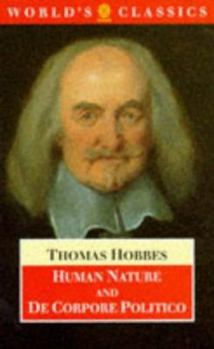The Elements of Law, Natural and Politic
Select Format
Select Condition 
Book Overview
Thomas Hobbes' timeless account of the human condition, first developed in The Elements of Law (1640), which comprises Human Nature and De Corpore Politico, is a direct product of the intellectual and political strife of the seventeenth century. His analysis of the war between the individual and the group lays out the essential strands of his moral and political philosophy later made famous in Leviathan. This first ever complete paperback edition...
Format:Paperback
Language:English
ISBN:0192831216
ISBN13:9780192831217
Release Date:September 1994
Publisher:Oxford University Press, USA
Length:344 Pages
Weight:0.40 lbs.
Dimensions:0.6" x 4.6" x 7.3"
Customer Reviews
2 ratings
Hobbes for starters
Published by Thriftbooks.com User , 16 years ago
This book is quite brilliant, and I would recommend this before Leviathan to most people that would want to get to know Hobbes' writing. It's a "lighter" text all over as far as I'm concerned, and it still gets most of it's points across in a great manner. The two books are also very similar, and for me, having read Leviathan beforehand, this was much of the same, only a little easier to read, as the translater has removed the capitalization etc that made the version I read of Leviathan a little archaic. Think what you want of Hobbes suggestions, I can fully understand why many shrink from his authoritative prescriptions, but read him nevertheless, because the foundations of his writing is incredibly fascinating and fun to read, and that part (About human nature etc.) should be interesting regardless of political views, contrary to his politics.
The First Modern Political Philosopher
Published by Thriftbooks.com User , 17 years ago
Thomas Hobbes (1588-1679) wrote "Leviathan" in 1651, it was his most important philosophical work. I think you should know something of Hobbes to understand how his thinking was influenced by his experiences. He was born 2 months prematurely on the day the Spanish Armada approaches the English coast. His mother's fear of invasion caused the premature birth. Hobbes remarked late in life, "his mother brought forth twins-myself and fear." Fear seems to be Hobbes life long companion and the key passion in his political system, which uses human passions as its foundation. He was a child prodigy reading Latin and Greek at the age of six years old. At fifteen, he entered Oxford University and hated his educational experience there. He thought the curriculum was too immersed in the ancient Greek philosophers like Aristotle. He called them "erroneous doctrines," and throughout his life he railed against English universities for there stodgy curriculum. At the age of 22, he graduates and takes a job to tutor the son of the Earl of Devonshire. It gives him the opportunity to travel throughout Europe where he meets with Galileo in Florence and Descartes in Paris. Descartes calls Hobbes the greatest political philosopher of his day. During the British civil war, Hobbes flees to Paris because he is a well-known monarchist sympathizer. In 1651, he publishes his monumental work "Leviathan." He returns to England, submits to Cromwell's government, and withdraws from politics. He is on friendly terms with Charles II when the Stuart's are restored to the throne. Hobbes philosophy is "materialistic"; he is greatly influenced by Galileo's mechanistic approach to science, and Euclidian geometry. His ambition was to explain all phenomena, man, and government with mathematical precision. In "Leviathan," he explains human conduct is a product of human passions. The most dominant passions are fear of violent death and desire for power, both are manifestations of man's most basic impulse, "self preservation." Hobbes asserts that the basic impulse is the right of the individual; he calls it a "natural right." All men process this natural right equally. This theory leads Hobbes to believe man's natural state to be one of constant conflict with each other. This leads him to write the following quote he is most known for: "men's lives are solitary, poor, nasty, brutish, and short." So as not to have to live in constant state of fear or conflict, men make a contract for protection with the state. Hobbes believes that the best state is one led by a single sovereign whose power must be unrestricted with all three branches of government devolving to him. A single sovereign who has absolute power and cannot be replaced by the people. His political writing had immediate influence in the world and influences other philosophers like Spinoza, Hutcheson, Locke, and Hume. Hobbes is the first man to write about political philosophy in such methodical terms




